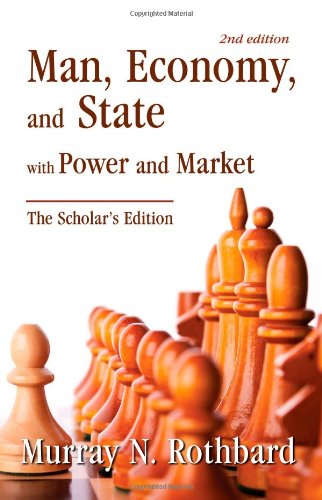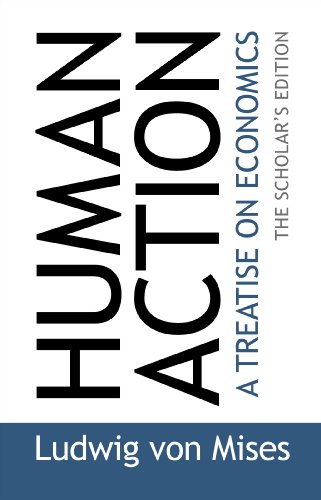Murray Rothbard’s Man, Economy, and State (MES) is one of the two greatest books on free market economics of the twentieth century. The other, of course, is Ludwig von Mises’s Human Action. Rothbard at first intended his book to be an easier-to-understand guidebook to Human Action, but it soon turned into a major treatise in its own right. Rothbard was too much of a creative genius to be limited to summarizing someone else’s book. In this week’s article, I’ll explain some of the reasons why MES is great, and why you need to read it.

Man, Economy, and Stat…
Best Price: $23.43
Buy New $29.95
(as of 08:10 UTC – Details)
First, let’s look at what Mises said about MES. He said that it made an “epochal” contribution to economics and that it made many important theoretical innovations: “In every chapter of his treatise, Dr. Rothbard, adopting the best of the teachings of his predecessors, and adding to them highly important observations, not only develops the correct theory but is no less anxious to refute all objections ever raised against these doctrines. He exposes the fallacies and contradictions of the popular interpretation of economic affairs. Thus, for instance, in dealing with the problem of unemployment he points out: in the whole modern and Keynesian discussion of this subject the missing link is precisely the wage rate. It is meaningless to talk of unemployment or employment without reference to a wage rate. Whatever supply of labor service is brought to market can be sold, but only if wages are set at whatever rate will clear the market. If a man wishes to be employed, he will be, provided the wage rate is adjusted according to what Rothbard calls his discounted marginal value product, i.e., the present height of the value which the consumers — at the time of the final sale of the product — will ascribe to his contribution to its production. Whenever the job seeker insists on a higher wage, he will remain unemployed. If people refuse to be employed except at places, in occupations, or at wage rates they would like, then they are likely to be choosing unemployment for substantial periods. The full import of this state of affairs becomes manifest if one gives attention to the fact that, under present conditions, those offering their services on the labor market themselves represent the immense majority of the consumers whose buying or abstention from buying ultimately determines the height of wage rates. Rothbard’s work is an epochal contribution to the general science of human action, praxeology, and its practically most important and, up to now, best-elaborated part, economics. Henceforth all essential studies in these branches of knowledge will have to take full account of the theories and criticisms expounded by Dr. Rothbard.”
One of the greatest things in MES is that Rothbard classifies all the possible types of government interference with the free market and shows what is wrong with them. If you read the book, you will be equipped to refute any opponent of the free market that you get into an argument with. He brilliantly explains how he classifies types of intervention: “What types of intervention can an individual or group commit? Little or nothing has so far been done to construct a systematic typology of intervention, and economists have simply discussed such seemingly disparate actions as price control, licensing, inflation, etc. We can, however, classify interventions into three broad categories. In the first place, the intervener, or ‘invader,’ or ‘aggressor’—the individual or group that initiates violent intervention—may command an individual subject to do or not do certain things, when these actions directly involve the individual’s person or property alone. In short, the intervener may restrict the subject’s use of his property, where exchange with someone else is not involved. This may be called an autistic intervention, where the specific order or command involves only the subject himself. Secondly, the intervener may compel an exchange between the individual subject and himself or coerce a ‘gift’ from the subject. We may call this a binary intervention, since a hegemonic relation is here established between two people: the intervener and the subject. Thirdly, the invader may either compel or prohibit an exchange between a pair of subjects (exchanges always take place between two people). In this case, we have a triangular intervention, where a hegemonic relation is created between the invader and a pair of actual or potential exchangers. All these interventions are examples of the hegemonic relation—the relation of command and obedience—in contrast to the contractual, free-market relation of voluntary mutual benefit.”

Human Action: The Scho…
Best Price: $6.75
Buy New $15.36
(as of 05:45 UTC – Details)
Let’s look at an example of how Rothbard explodes arguments for intervention. Many people claim that the ordinary consumer lacks enough information to make purchases in his own interest, Consumers thus need to be guided by “experts.” Rothbard pulverizes this objection: “Consumers also take entrepreneurial risks on the market. Many critics of the market, while willing to concede the expertise of the capitalist-entrepreneurs, bewail the prevailing ignorance of consumers, which prevents them from gaining the utility ex post that they had expected ex ante. Typically, Wesley C. Mitchell entitled one of his famous essays: ‘The Backward Art of Spending Money.’ Professor Mises has keenly pointed out the paradox of interventionists who insist that consumers are too ignorant or incompetent to buy products intelligently, while at the same time proclaiming the virtues of democracy, where the same people vote for or against politicians whom they do not know and on policies which they scarcely understand. To put it another way, the partisans of intervention assume that individuals are not competent to run their own affairs or to hire experts to advise them, but they also assume that these same individuals are competent to vote for these experts at the ballot box. They are further assuming that the mass of supposedly incompetent consumers are competent to choose not only those who will rule over themselves, but also over the competent individuals in society. Yet such absurd and contradictory assumptions lie at the root of every program for ‘democratic’ intervention in the affairs of the people. In fact, the truth is precisely the reverse of this popular ideology. Consumers are surely not omniscient, but they have direct tests by which to acquire and check their knowledge. They buy a certain brand of breakfast food and they do not like it; and so they do not buy it again. They buy a certain type of automobile and like its performance; they buy another one. And in both cases, they tell their friends of this newly won knowledge. Other consumers patronize consumers’ research organizations, which can warn or advise them in advance. But, in all cases, the consumers have the direct test of results to guide them. And the firm which satisfied the consumers expands and prospers and thus gains ‘good will,’ while the firm failing to satisfy them goes out of business. On the other hand, voting for politicians and public policies is a completely different matter. Here there are no direct tests of success or failure whatever, neither profits and losses nor enjoyable or unsatisfying consumption. In order to grasp consequences, especially the indirect catallactic consequences of governmental decisions, it is necessary to comprehend complex chains of praxeological reasoning. Very few voters have the ability or the interest to follow such reasoning, particularly, as Schumpeter points out, in political situations. For the minute influence that any one person has on the results, as well as the seeming remoteness of the actions, keeps people from gaining interest in political problems or arguments. Lacking the direct test of success or failure, the voter tends to turn, not to those politicians whose policies have the best chance of success, but to those who can best sell their propaganda ability. Without grasping logical chains of deduction, the average voter will never be able to discover the errors that his ruler makes. George J. Schuller, in attempting to refute this argument, protested that: ‘complex chains of reasoning are required for consumers to select intelligently an automobile or television set.’ But such knowledge is not necessary; for the whole point is that the consumers have always at hand a simple and pragmatic test of success: does the product work and work well? In public economic affairs, there is no such test, for no one can know whether a particular policy has ‘worked’ or not without knowing the a priori reasoning of economics.”
 Another vital point in MES is that the level of the income tax is much more important than whether the tax is “proportional” or “progressive’: While the progressive principle is certainly highly destructive of the market, most conservative, pro-free-market economists tend to overweigh its effects and to underweigh the destructive effects of proportional taxation. Proportional income taxation has many of the same consequences, and therefore the level of income taxation is generally more important for the market than the degree of progressivity. Thus, society A may have a proportional income tax requiring every man to pay 50 percent of his income; society B may have a very steeply progressive tax requiring a poor man to pay 1/4 percent and the richest man 10 percent of his income. The rich man will certainly prefer society B, even though the tax is progressive—demonstrating that it is not so much the progressivity as the height of his tax that burdens the rich man. 1/4 Incidentally, the poor producer, with a lower tax upon him, will also prefer society B. This demonstrates the fallacy in the common conservative complaint against progressive taxation that it is a means ‘for the poor to rob the rich.’ For both the poor man and the rich man have, in our example, chosen progression! The reason is that the ‘poor’ do not ‘rob the rich’ under progressive taxation. Instead, it is the State that ‘robs’ both through taxation, whether proportional or progressive.”
Another vital point in MES is that the level of the income tax is much more important than whether the tax is “proportional” or “progressive’: While the progressive principle is certainly highly destructive of the market, most conservative, pro-free-market economists tend to overweigh its effects and to underweigh the destructive effects of proportional taxation. Proportional income taxation has many of the same consequences, and therefore the level of income taxation is generally more important for the market than the degree of progressivity. Thus, society A may have a proportional income tax requiring every man to pay 50 percent of his income; society B may have a very steeply progressive tax requiring a poor man to pay 1/4 percent and the richest man 10 percent of his income. The rich man will certainly prefer society B, even though the tax is progressive—demonstrating that it is not so much the progressivity as the height of his tax that burdens the rich man. 1/4 Incidentally, the poor producer, with a lower tax upon him, will also prefer society B. This demonstrates the fallacy in the common conservative complaint against progressive taxation that it is a means ‘for the poor to rob the rich.’ For both the poor man and the rich man have, in our example, chosen progression! The reason is that the ‘poor’ do not ‘rob the rich’ under progressive taxation. Instead, it is the State that ‘robs’ both through taxation, whether proportional or progressive.”
Let’s do everything we can to encourage people to read MES— a great masterpiece by one of the greatest thinkers of the twentieth century.













